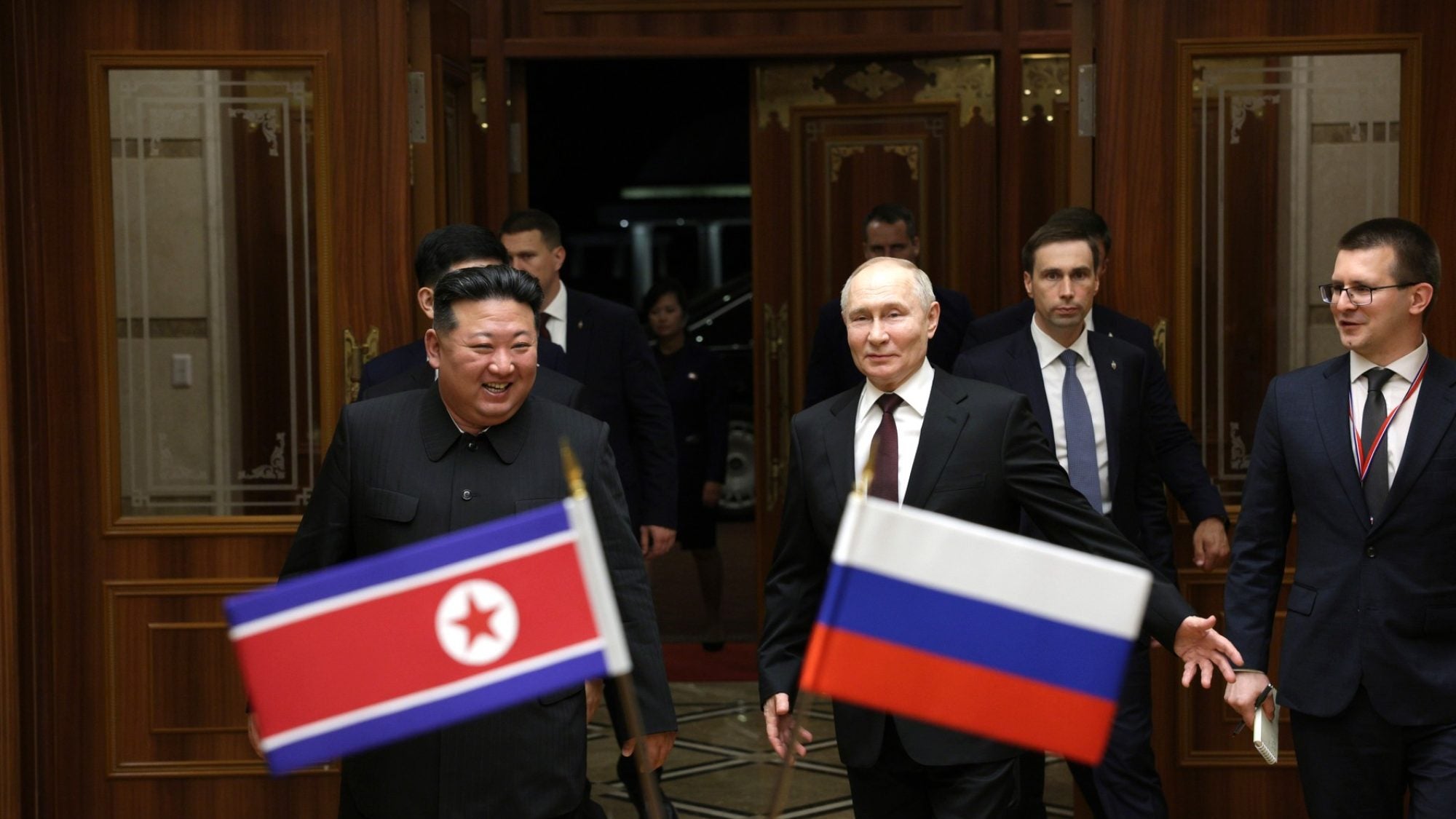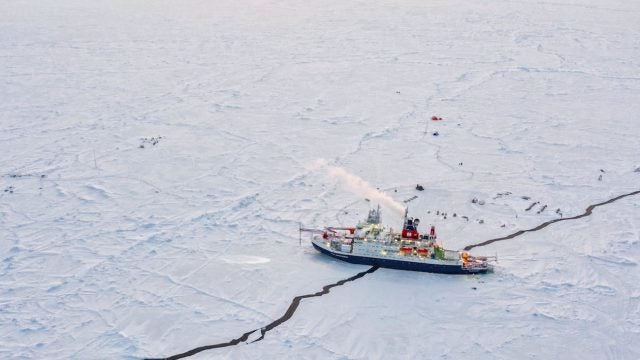
Title: North Korean Forces in Ukraine: What it Means and What to Do
The presence of North Korean forces in Ukraine could reinforce Russian propaganda aimed at forcing Ukraine into an unfavorable ceasefire by adding to misperceptions that the war might be unwinnable. However, Russia’s reliance on imported troops is actually a sign of weakness and a signal that the Kremlin is running low on manpower. Notwithstanding recent statements from U.S. leadership, NATO governments should avoid taking the bait of a “peace” process on Russian terms, and realize that the objective is not merely a ceasefire but a solution that reinforces rather than undermines regional and global stability while maintaining support for Ukraine.
Introduction
In October 2024, the Democratic People’s Republic of Korea (DPRK) sent approximately 12,000 of its soldiers to Russia to participate in Russia’s war against Ukraine. Since then, North Korean forces have been involved in combat operations and taken significant losses. The presence of outside forces was intended to demonstrate the Kremlin’s willingness to prolong the conflict and strengthen Russian negotiating positions in possible ceasefire talks. That Moscow felt forced to turn to another source of manpower and task outsiders with dying to preserve Russian ambition, however, should be read as a sign of weakness. Developing policies that maximize the likelihood of sustainable peace will require understanding Russian motivations for turning to Kim Jong Un and avoiding Moscow’s game. Thus, Western leaders should follow a balanced policy that pairs maintaining support to Kyiv with an openness to diplomacy while not being influenced by Russian efforts.
Support for Russia’s Propaganda
Although the employment of outside forces in time of war is nothing new, it is unusual for a large country enjoying a substantial advantage in population size to do so. The North Korean forces are not mercenaries in the traditional sense of private military contractors, but the presumed transactional nature of the arrangement denotes a mercenary motivation from Pyongyang. This is not an alliance of governments sharing interests and values. Just as Russia is using DPRK forces to achieve its military objectives, North Korea is not assisting Russia as an ally protecting common interests but as a party expecting something in return.
In the past year, Russia has gained some additional Ukrainian territory, but at the cost of the highest casualty rates of the war. Such losses are likely not sustainable, despite Russia’s traditional preference for wars of attrition. Having North Korean forces available to absorb casualties could potentially enable Russia to maintain its war effort longer and, perhaps more importantly, continue to make its narrative case that NATO’s military assistance to Ukraine is futile. Evidently, bringing in thousands of North Koreans two and a half years into the war, when Russian casualties are at their highest levels, demonstrates Russia’s growing desperation to end or freeze hostilities with Russian gains intact.
Throughout 2024, Russia ramped up efforts to create the appearance that military success—the set of conditions that the Kremlin can characterize as victory—is inevitable and that Ukraine will not recover territory by military means. Given the overall size of the Russian forces already involved, 12,000 archaically trained and equipped North Koreans would be unlikely to make a huge difference in the military balance. Instead, this development should be considered a signal that Russia is looking for ways to stay the course.
After the failure of its initial effort in 2022 to topple the Ukrainian government and replace it with Russian puppets, Russia has sought to grab as much Ukrainian territory as possible, while using nuclear blackmail to force NATO leaders to limit aid and force Ukraine to stop fighting. Major ground operations to capture strategically insignificant villages, the deployment of new, exotic weapons, and frequent threats of nuclear use are all elements of this strategy. In light of this, the presence of North Korean forces regardless of their actual military effectiveness reinforces the carefully cultivated impression that there is no military path to victory for Ukraine by introducing a new and potentially large supply of manpower. All this has led to calls, including by western political leaders, to impose a ceasefire that would recognize Russia’s gains, which could set the stage for further conflict. Although such calls have not directly referenced the presence of North Korean forces, the underlying assumption that Russia can absorb heavy losses indefinitely depends to some extent on the availability of additional manpower. As of March 2025, however, the relative ineffectiveness of the North Korean forces has limited the geopolitical impact of their presence.
Uncomfortable Implications
There is something even more unsettling, however, about the presence of North Korean forces in Ukraine to prolong the violence. Although there has been no shortage of armed conflicts, governments, particularly of nuclear states, have subscribed to, though not always followed, a general consensus since World War II that force should be a last resort to settle differences between states. Russia decisively strayed from this model when it attacked Ukraine in 2022. For Ukraine, the conflict is a question of national independence and identity, but it has important implications for all states. Russian success, or the perception of it, would seem to legitimize military aggression as a tool of statecraft. Moreover, the salience of nuclear threats in Russian policy ensures that even a tenuous Russian victory will add to the perceived benefits of leveraging nuclear forces, complicating nonproliferation efforts and effectively legitimizing the use of such tactics as instruments of state power. Similarly, should North Korea be perceived as contributing to a Russian success, it could also lead to increased willingness for Pyongyang to consider military options on the Korean Peninsula given the international community’s apparent impotence when confronting nuclear-backed violence.
Despite hopeful talk of an “alliance,” the relationship between Moscow and Pyongyang remains one of mutual convenience. Russia is able to draw on additional personnel resources whose loss will not increase public discontent with the war. Meanwhile, North Korea presumably gains access to Russian military technology, particularly drones, missiles and other potential weapons of mass destruction (WMD) delivery systems. As long as both sides continue to perceive benefits, the arrangement will persist. This could set a precedent for future conflicts in which soldiers from poorer countries are used as cannon fodder. While this practice is hardly new—European powers recruited colonial troops and the Confederacy turned to native Americans—it has been less common of late.
Notwithstanding the moral issue of treating some lives as more valuable than others, resorting to imported troops has two additional troubling implications. First, it lowers the social cost of war by removing the most tangible negative for domestic populations: the immediate tragedy of casualties among one’s family and neighbors. Russian and North Korean millitary doctrine emphasize the use of infantry to capture ground at the cost of casualties. Russia is trying to shift these casualties, and the likely loss of public support for the war, to their partners. Second, it can prolong conflicts and the associated suffering by increasing the supply of the most important military resource: manpower. For all that the conflict in Ukraine features increased use of drones, standoff weapons, and advanced technology, it is still largely fought by infantry on the ground. By outsourcing the cost of war, Russia and North Korea are making it more palatable to their respective publics and ultimately making armed aggression more viable as a tool of statecraft.
Policy Prescription
Considering North Korea’s troop presence in Ukraine, the question arises of what Western leaders can do to minimize the negative consequences. Focusing on strategic issues rather than tactics, the obvious answer is to not reward the practice. Should Russia and North Korea be perceived as achieving their strategic objectives through military cooperation, it is reasonable to believe the example will be followed. Therefore, giving Russia what it wants, by either curtailing military assistance to Ukraine or pursuing a ceasefire that legitimizes military conquests, would encourage future military cooperation between Moscow and Pyongyang that could destabilize the Korean Peninsula or contribute to the almost inevitable renewal of the Ukraine conflict.
This issue has come sharply into focus since President Trump took office, as his administration has prioritized reaching an early ceasefire. The simplest path to halt the violence seems to be freezing the front lines in place and telling Kyiv to accept it. This is more or less what Russia has sought since mid-2022, and likely what Moscow hoped would result from prolonging the conflict by importing foreign forces. However, forcing Ukraine to accept a partial occupation in return for a ceasefire was unsuccessfully attempted in 2014. Rather than handing Moscow everything it wants on a silver platter, U.S. policy should depend on Ukraine’s wishes and the understanding that the objective is not merely a ceasefire but a solution that reinforces rather than undermines regional and global stability while maintaining support for Ukraine.
A sustainable policy would involve steps to avoid any perception that the arrival of North Korean forces led the West to force “peace” on Ukraine by pushing Kyiv for a ceasefire. Instead of cutting security assistance, a proper approach would underline that it is up to Ukraine to decide when (and if) it should consider trading land for peace. As noted above, the presence of North Korean troops indicates that on some level, Russia believes its manpower insufficient. As such, governments with an interest in upholding the rules-based international order and not validating wars of conquest would do well to see if Russia is truly nearing its limit.
It can be difficult to predict when armies will reach a breaking point. Should Russia run out of steam in Ukraine, despite the presence of North Korean troops, the stage will be set for productive diplomacy that could have a chance at producing a lasting peace. The necessary conditions will be maintaining assistance to Ukraine while countering the narrative that through nuclear blackmail and importing foreign forces Russia has gained the upper hand.
As previously discussed, Moscow’s decision to turn to North Korean forces has a number of negative implications, including prolonging a destructive conflict and increasing the potential that military aggression may be rewarded. Considering the importance of avoiding any perception that importing forces leads to military success, Western governments should continue assisting Ukrainian resistance. That Russia has been desperate enough to need to bring in foreign forces should indicate that a policy of enabling Ukraine to fight back is to some measure effective and can be refined to highlight the cost to Russia for continuing its aggression. Although North Korean forces thus far have had a negligible military role, their presence could impact perceptions of how the conflict is playing out. A policy in response to this development should treat it as a sign of weakness, not strength.
. . .
John Erath is the Senior Policy Director for the Center for Arms Control and Non-Proliferation, overseeing the policy team and guiding work on issues including Russia, North Korea, China, Iran, U.S. domestic nuclear policy and more. This follows 30 years of government service, much of it in arms control and non-proliferation. Most recently, he completed a two-year assignment on the U.S. National Security Council, where he was responsible for European issues. In this capacity, he focused on cooperation with NATO and the European Union, as well as heading White House efforts to improve stability in the Balkans. He has served in diplomatic posts in the Balkans, former Soviet Union, Brazil and India and holds degrees from Georgetown University and the National War College.
Image Credit: Office of the President of the Russian Federation, CC 4.0, Via Wikimedia Commons.
Recommended Articles

Critical maritime infrastructures (CMI), and in particular undersea communication cables, are increasingly under threat of attacks by malign actors who benefit from asymmetric capabilities and jurisdictional complexities in the maritime…

This article explores how the Palestinian crisis and the death of the two-state solution endangers the Hashemite Kingdom of Jordan. It illuminates the complicated relationship between Jordan, Israel, and Palestine…

This article explores the uncertain future of Arctic governance amid shifting global geopolitics. It argues that whether Washington and Moscow opt for confrontation or cooperation, multilateralism in the Arctic…